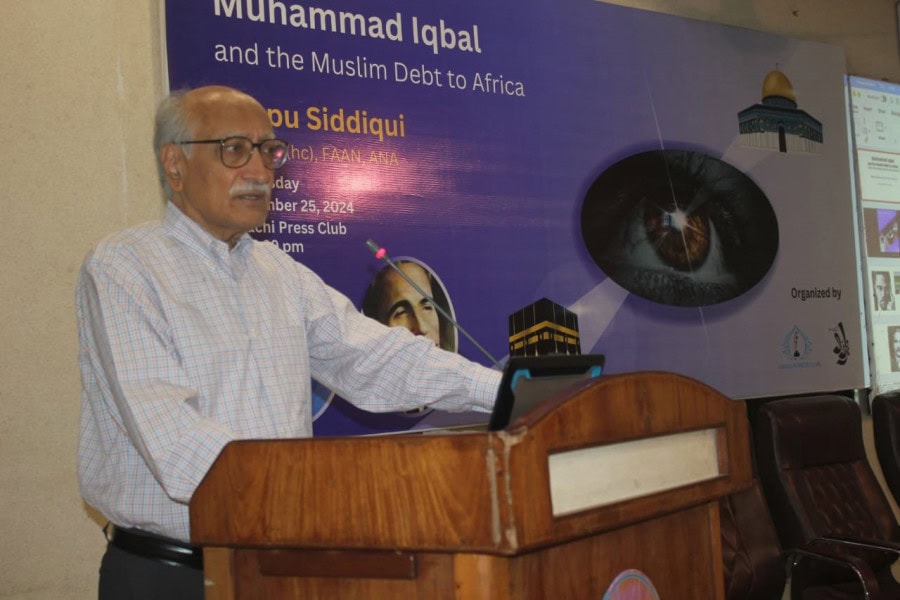Renowned neuroscientist, researcher, and Iqbal scholar, Dr. TipuSiddiq, emphasized that Allama Iqbal discouraged nationalism and advocated for the unity of the Muslim Ummah. His life’s mission was to unite the Muslim world as one nation, and today’s youth must be educated about Iqbal’s way of life. Dr. Tipu expressed these views on Wednesday while delivering a lecture titled “Allama Iqbal’s Poetry and the Muslim Debt to Africa” at the Karachi Press Club, organized in collaboration with Karwan-e-Iqbal.
The event attracted a diverse audience, including journalists, teachers, young students, and professionals from various fields, all eager to hear the lecture. Karachi Press Club Secretary Shoaib Ahmed, prominent chest physician Dr. Sohail Akhtar, and Karwan-e-Iqbal’s coordinator Dr. Zafar Iqbal also addressed the gathering. Dr. TipuSiddiq highlighted that Iqbal’s poetry, written in both Urdu and Persian, has been translated into multiple languages. His poetry is intellectually stimulating and awakens a revolutionary spirit. Through his verses, Iqbal consistently preached defiance against worldly powers and emphasized the principle of monotheism.
Dr. Tipu further noted that Iqbal’s ultimate goal was to forge unity within the Muslim Ummah, rejecting geographical boundaries and hereditary privileges. His deep love for the Islamic world and unparalleled devotion to the Prophet Muhammad (PBUH) were the cornerstones of his philosophy.
Dr. Tipu also shared that regions like Bhopal, Hyderabad, Afghanistan, Iran, Tajikistan, and Uzbekistan have a deep connection with Iqbal, and Hyderabad still houses the Allama Iqbal Academy. Iqbal held Afghanistan in special regard, and during his visit to the country, he expressed profound spiritual experiences. Recalling Iqbal’s literary contributions, Dr. Tipu pointed out his celebrated works in Persian such as “Asrar-e-Khudi,” “Rumuz-e-Bekhudi,” “Payam-e -Mashriq,” and “Javid Nama,” alongside his masterpieces in Urdu like “Bang-e-Dra,” “Bal-e-Jibril,” “Zarb-e-Kaleem,” and “Armaghan-e-Hijaz.”
He described Iqbal’s era as one of political turmoil and social unrest for the Eastern nations, a sentiment vividly reflected in his poetry. Iqbal’s poetry is a commentary on philosophy, history, and intellectual facts, but his greatest achievement was embedding his profound message and philosophy in the beauty of high literature. His ideas left a lasting impact on thinkers from both the East and the West.
According to Dr. Tipu, Iqbal’s uniqueness lies in viewing every aspect of life through the lens of Islam and showing the Muslim world the path to regaining past glory through the concept of “Khudi” (selfhood). Dr. TipuSiddiq further highlighted that Africa has the largest Muslim population in the world, and Iqbal specifically referenced Africa in his poetry, calling its people “the eyes of the Earth.” He mentioned that the land of Africa was the first to provide refuge to early Muslims during the migration to Abyssinia and discussed how Iqbal’s poetry immortalized the call to prayer of Hazrat Bilal (RA), whose voice lives on while the Roman Empire has faded into history.
Dr. Tipu also noted that Jewish dominance in world affairs lasted only briefly, while Muslims ruled the world for over twelve centuries. At the ocassion, Karachi Press Club Secretary Shoaib Ahmed presented Dr. TipuSiddiq with an Ajrak and a shield, an honor warmly received by the attendees.










